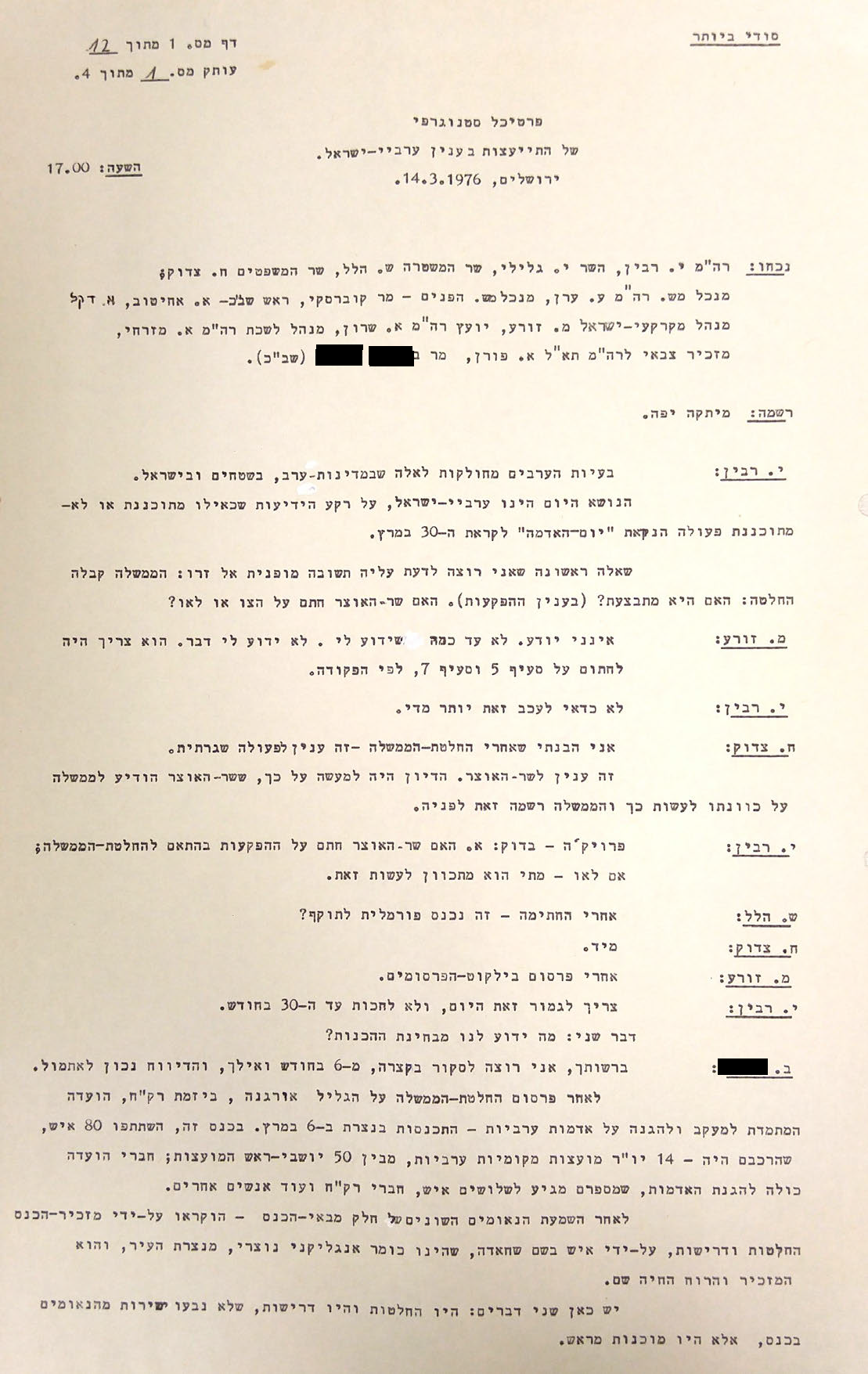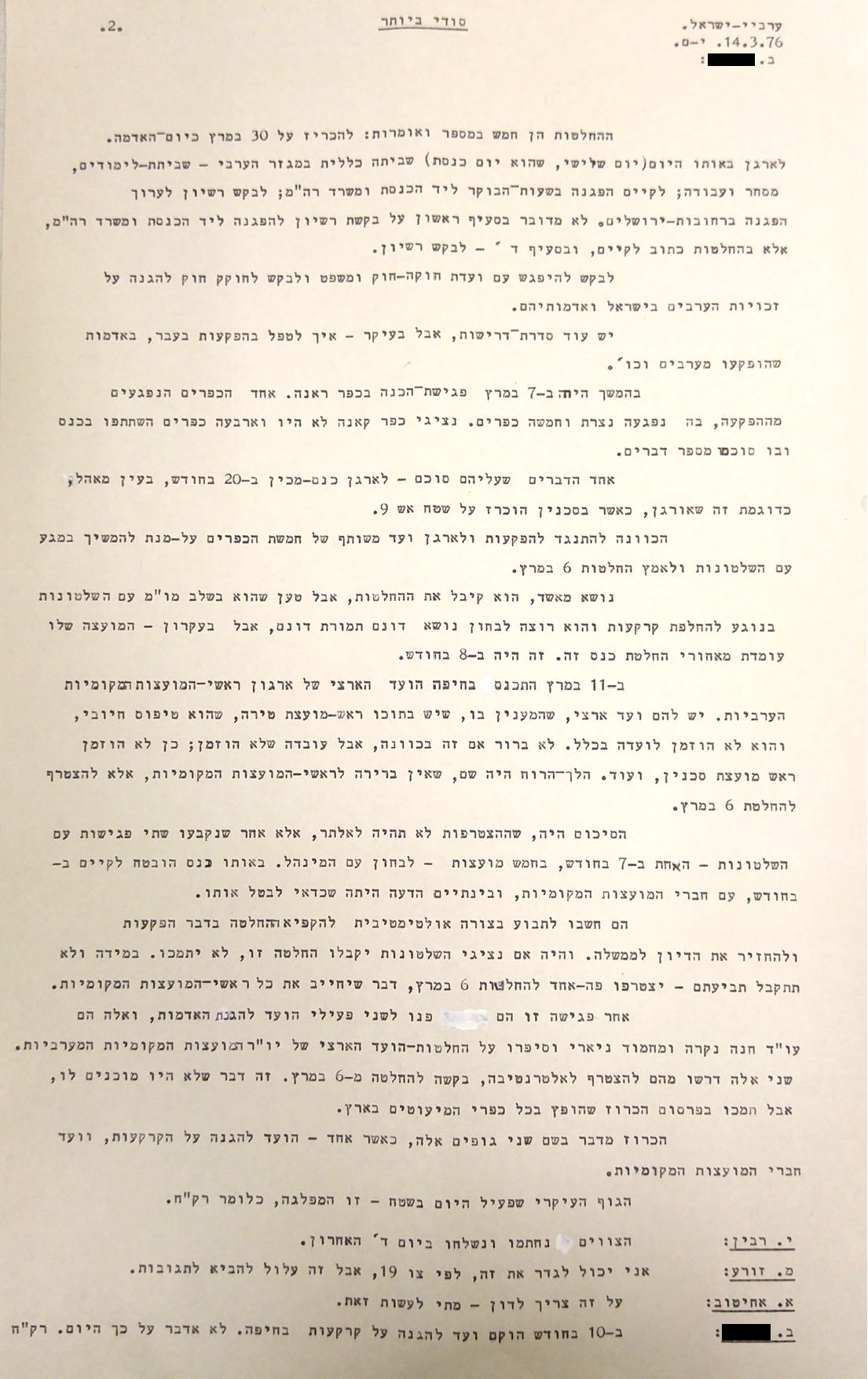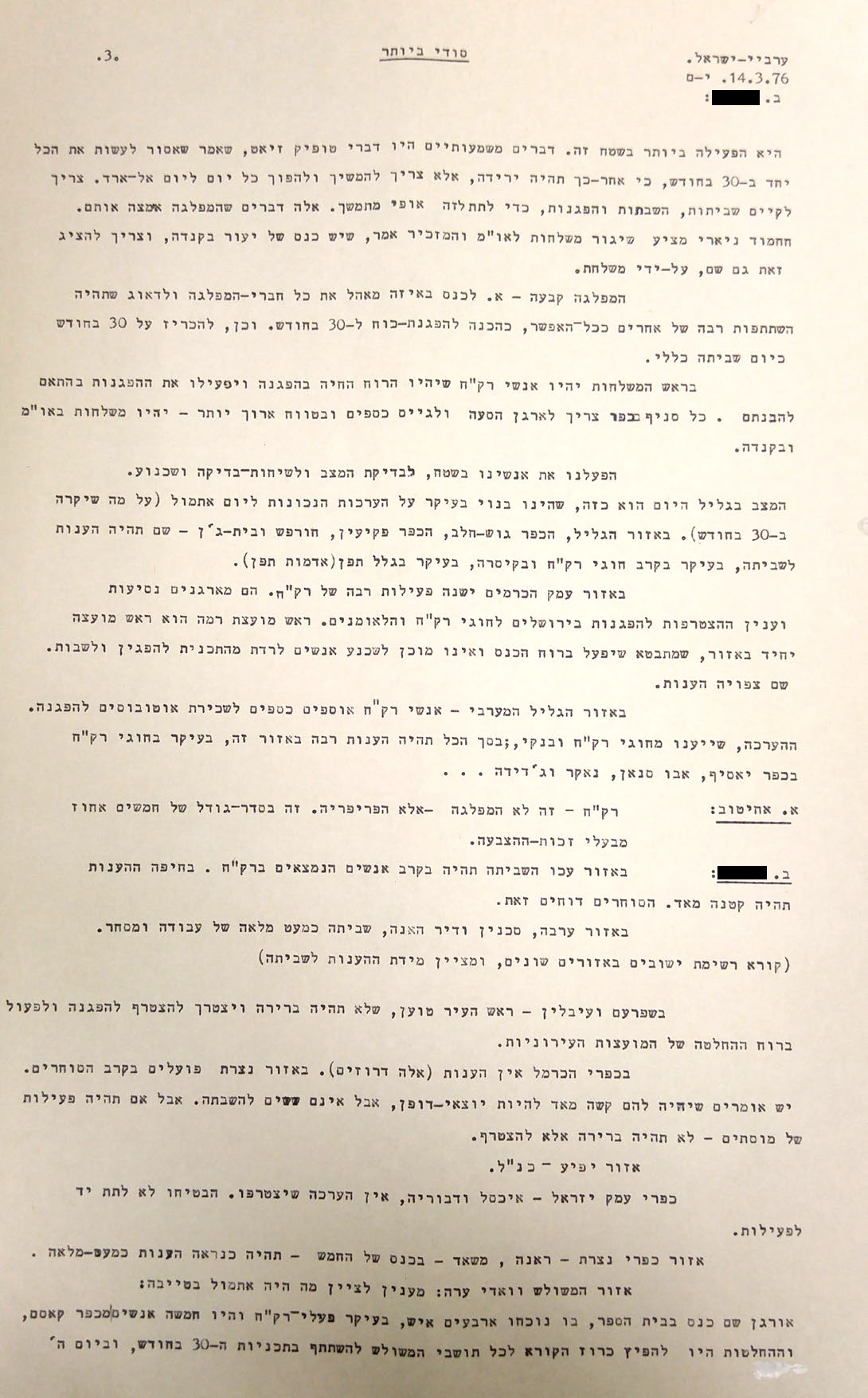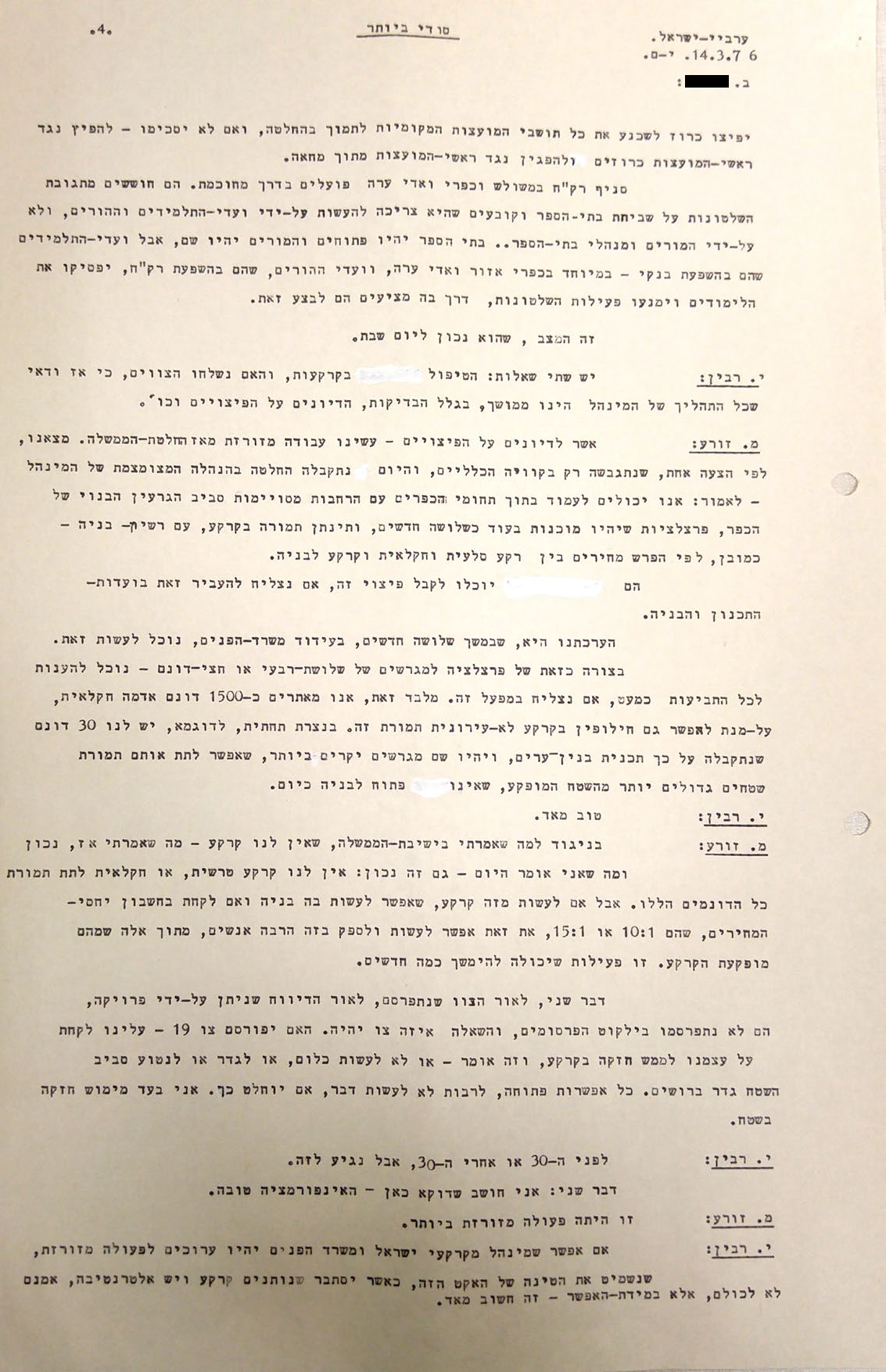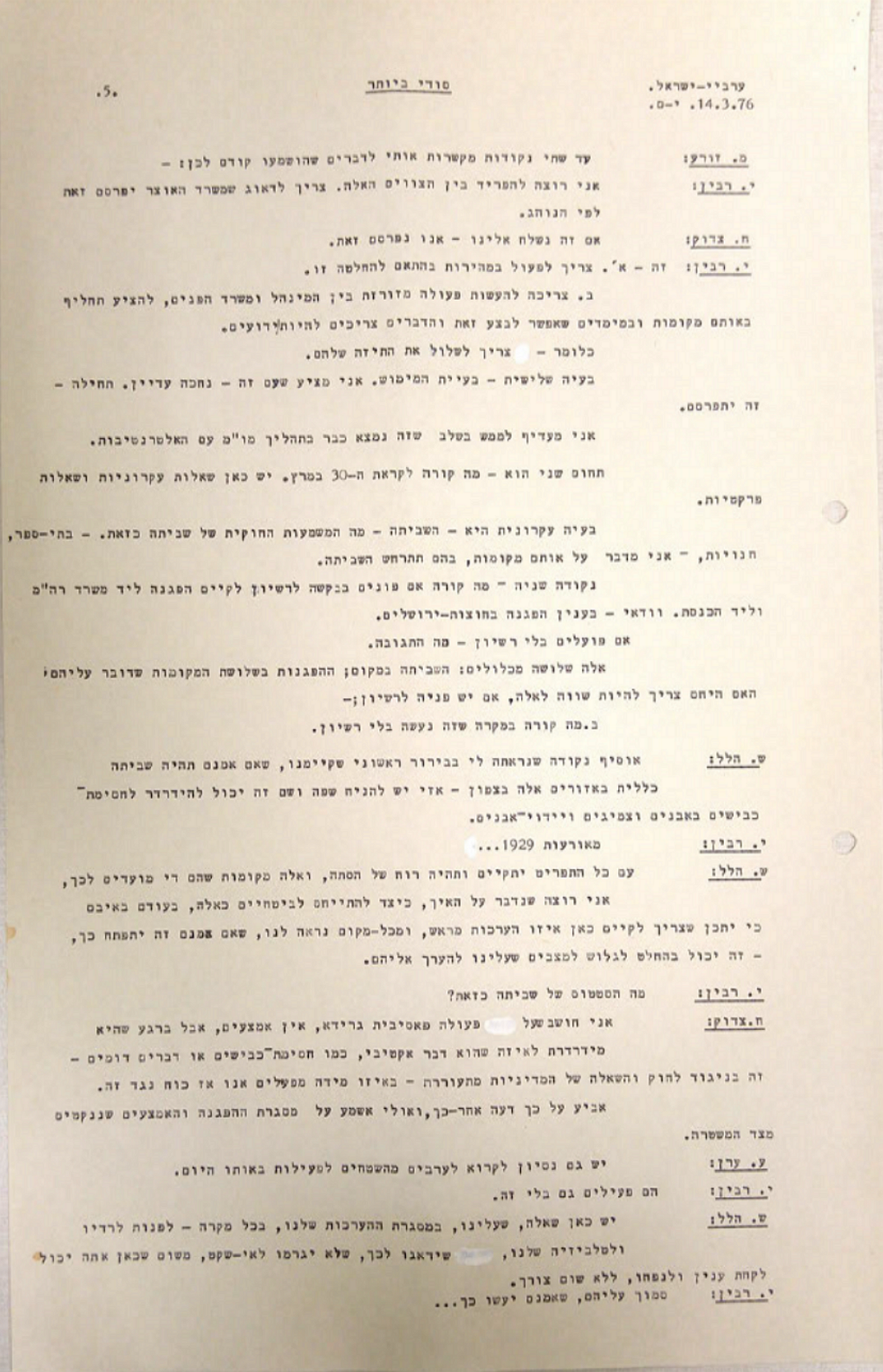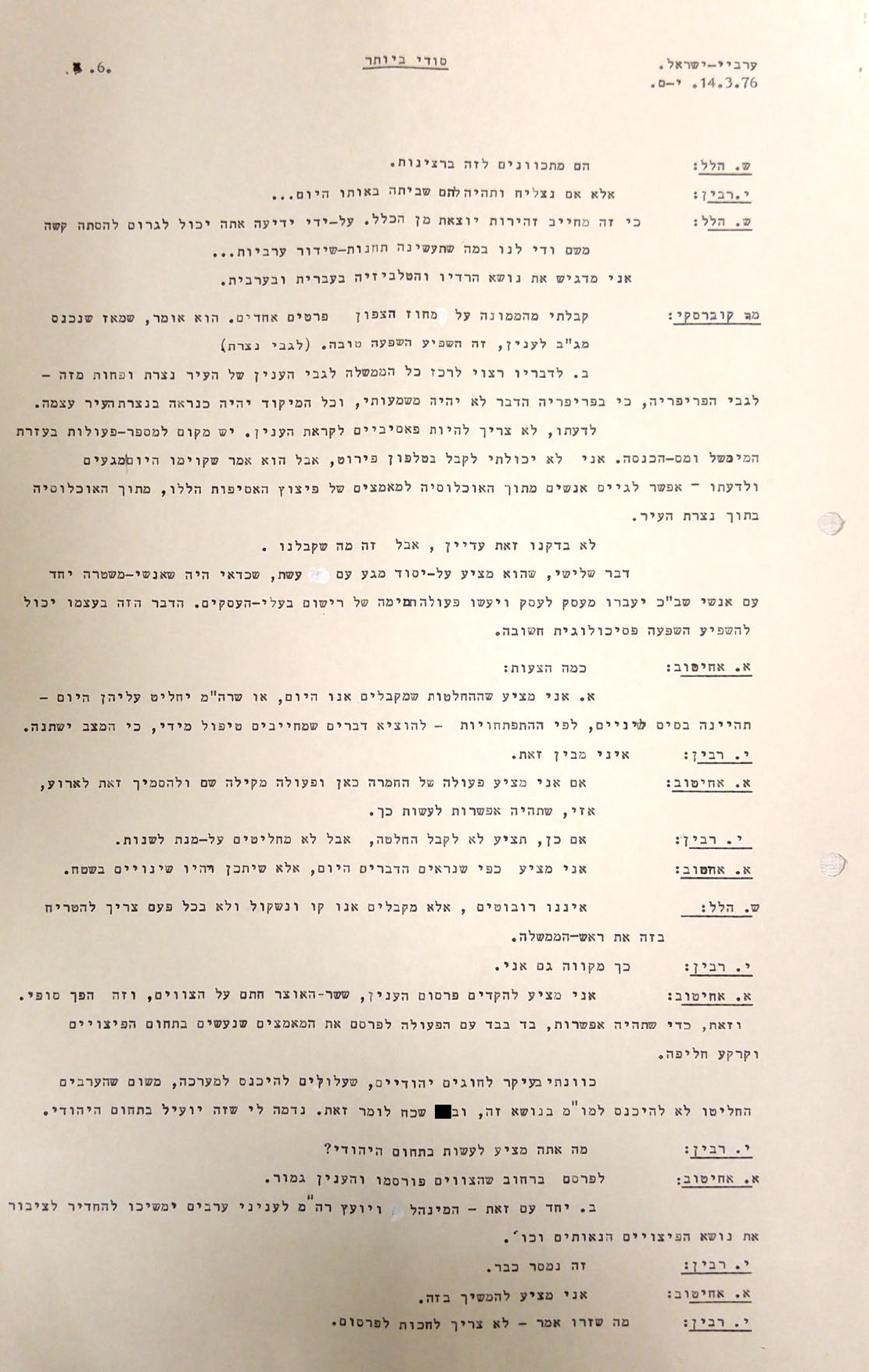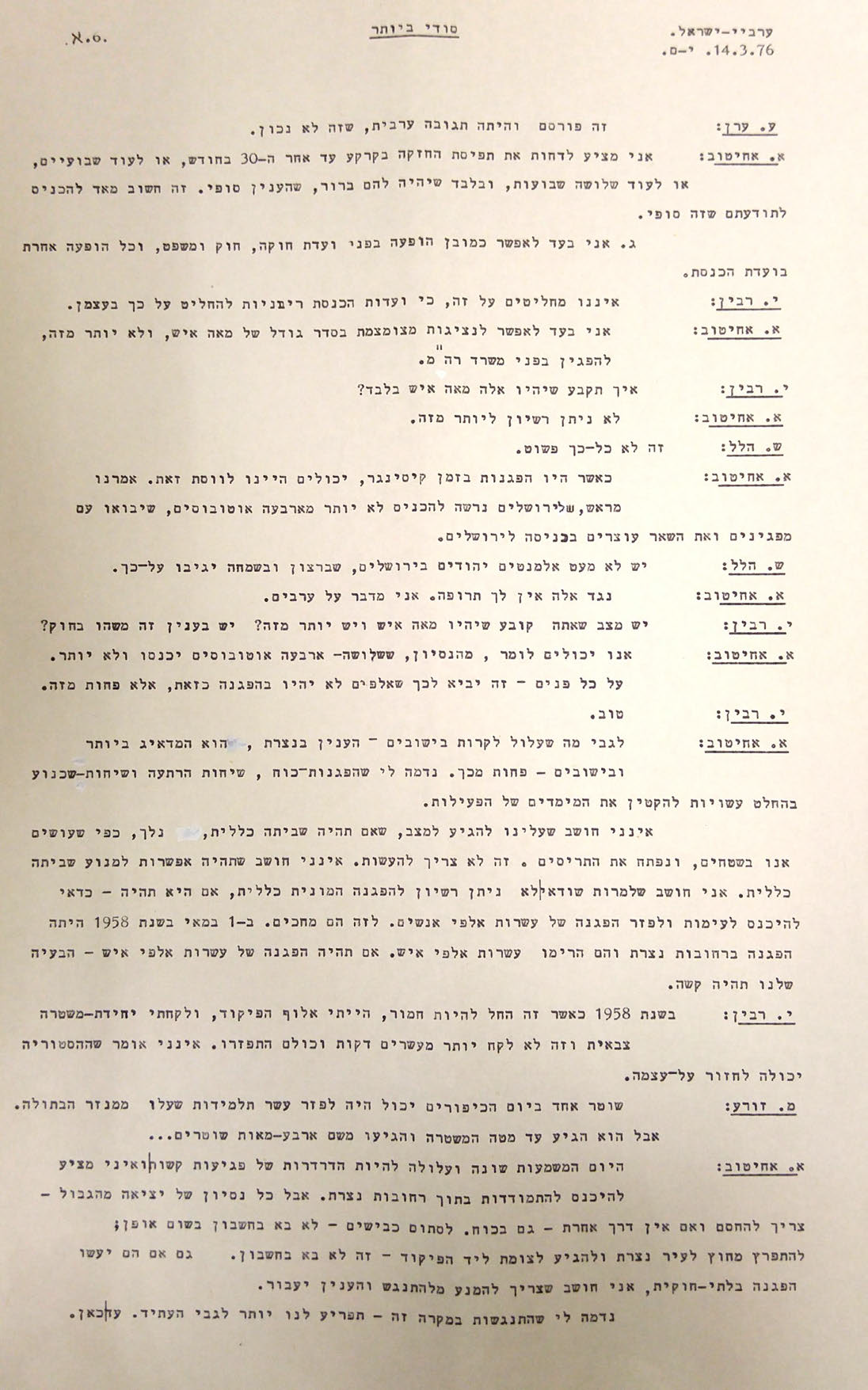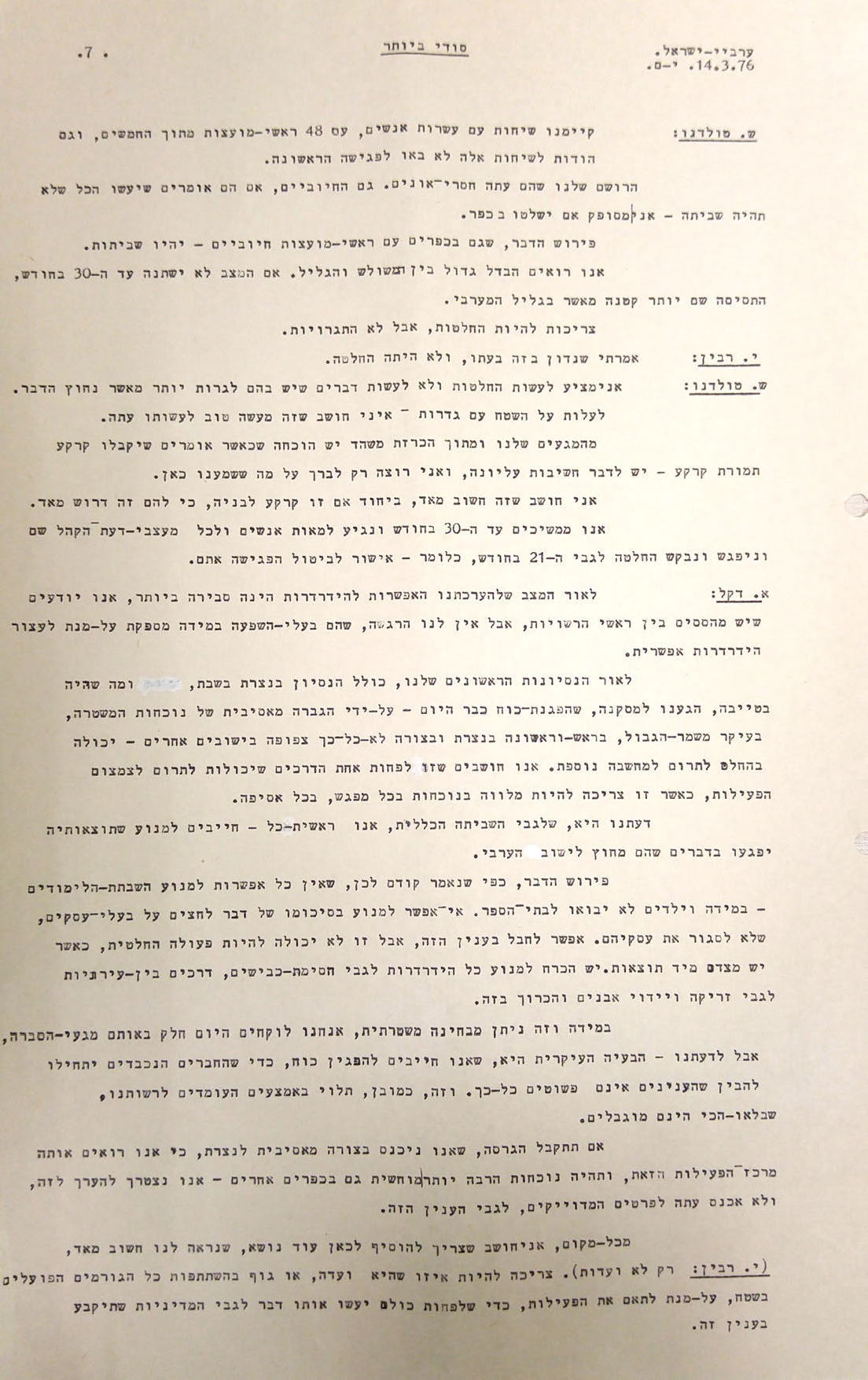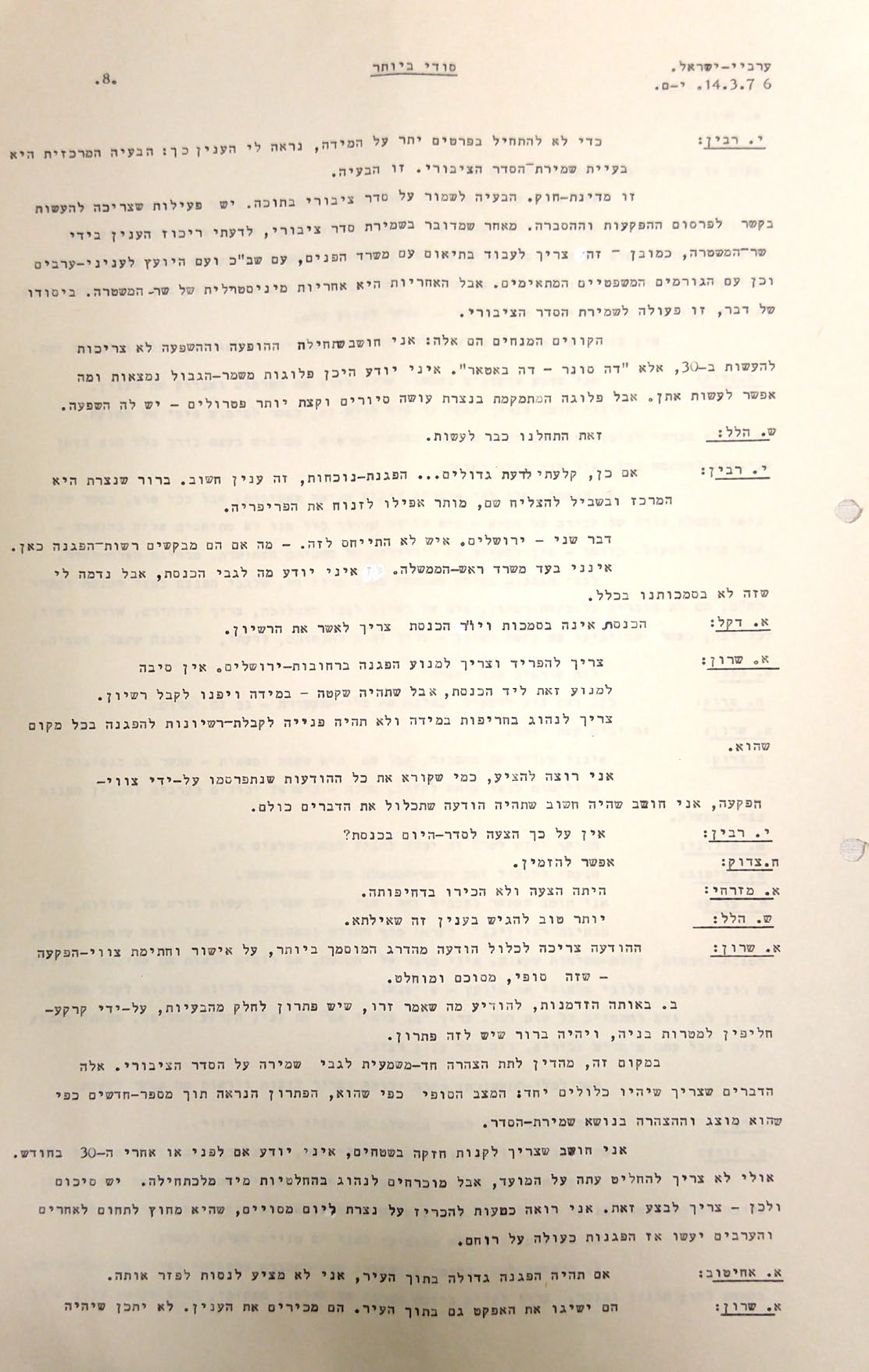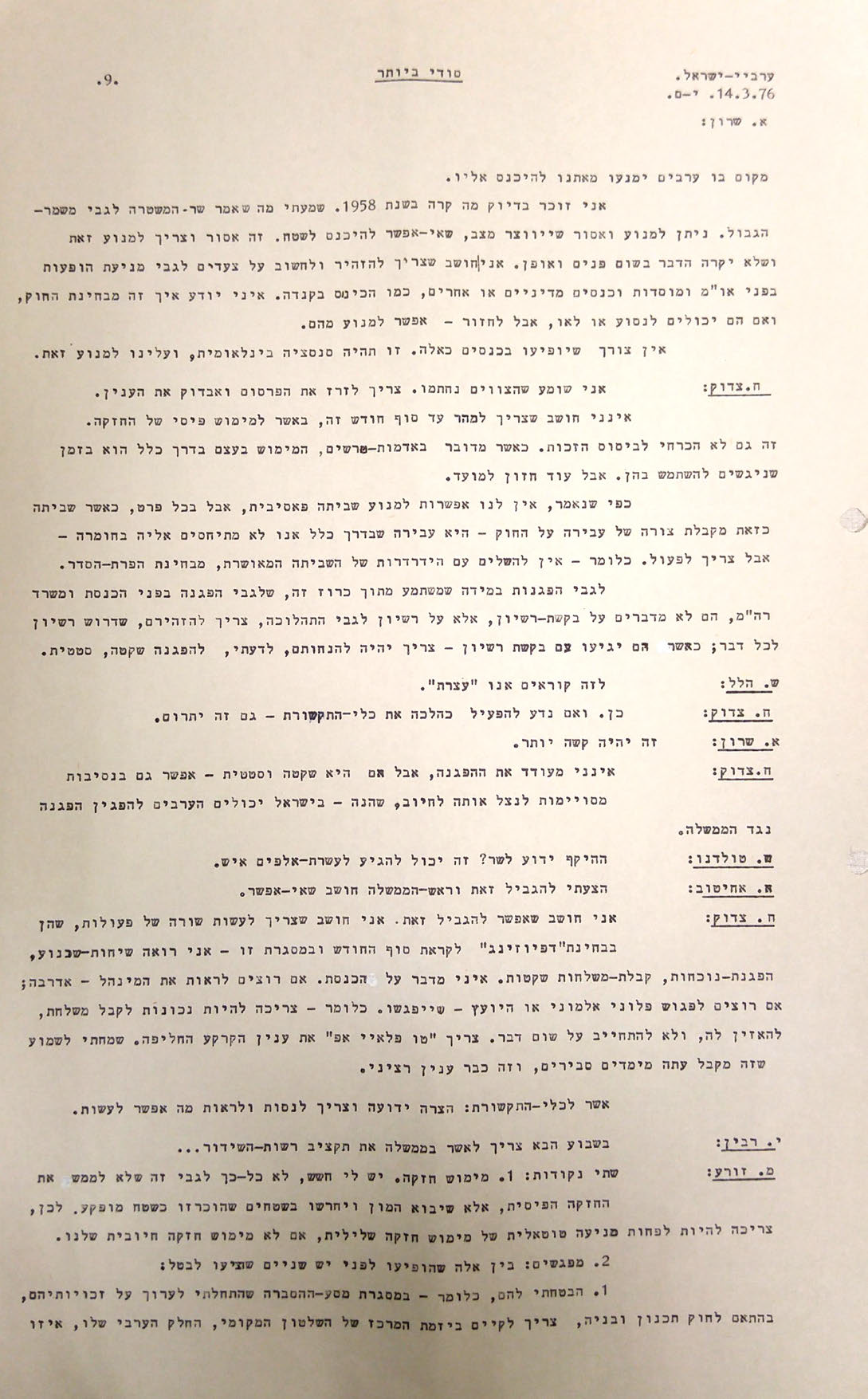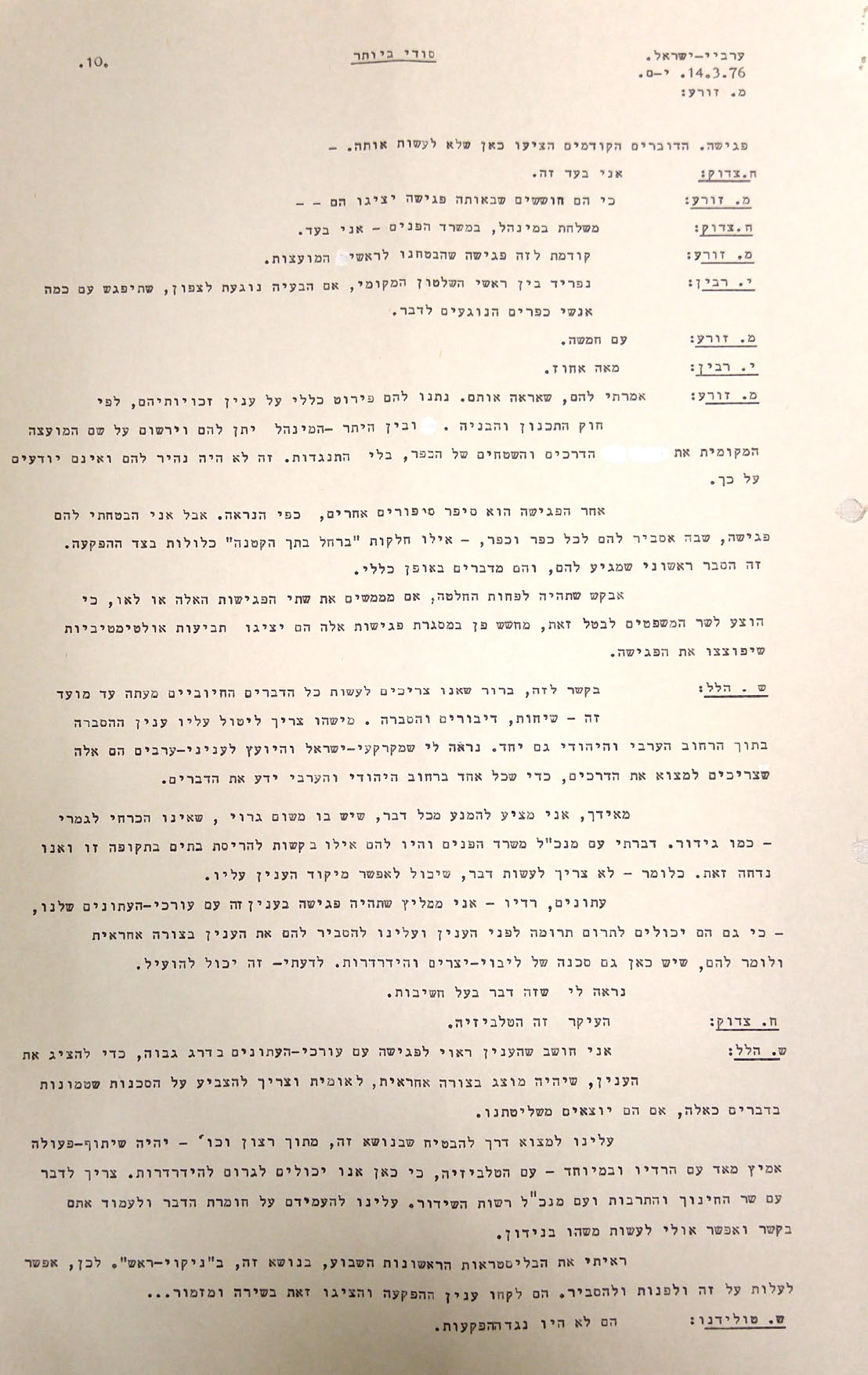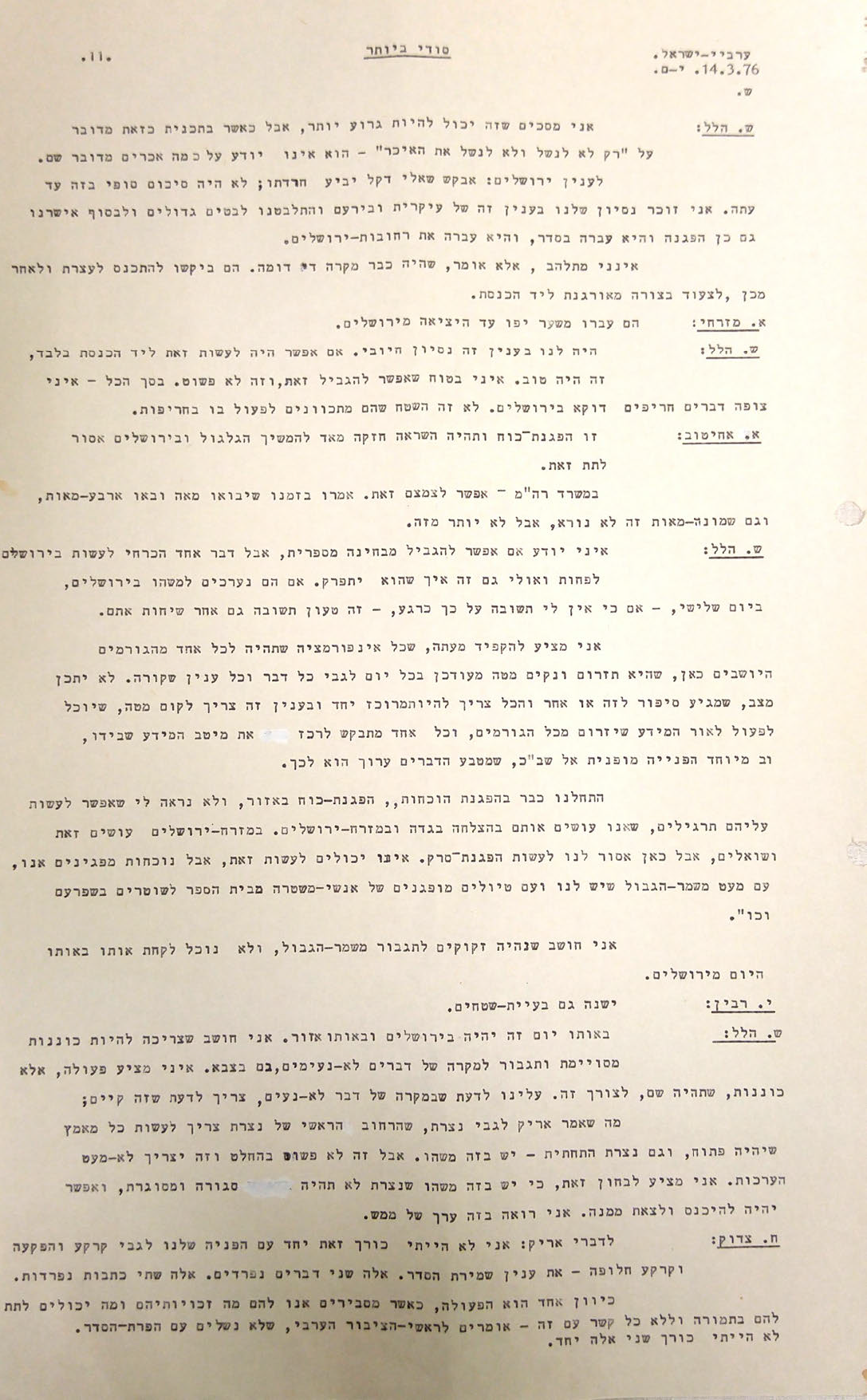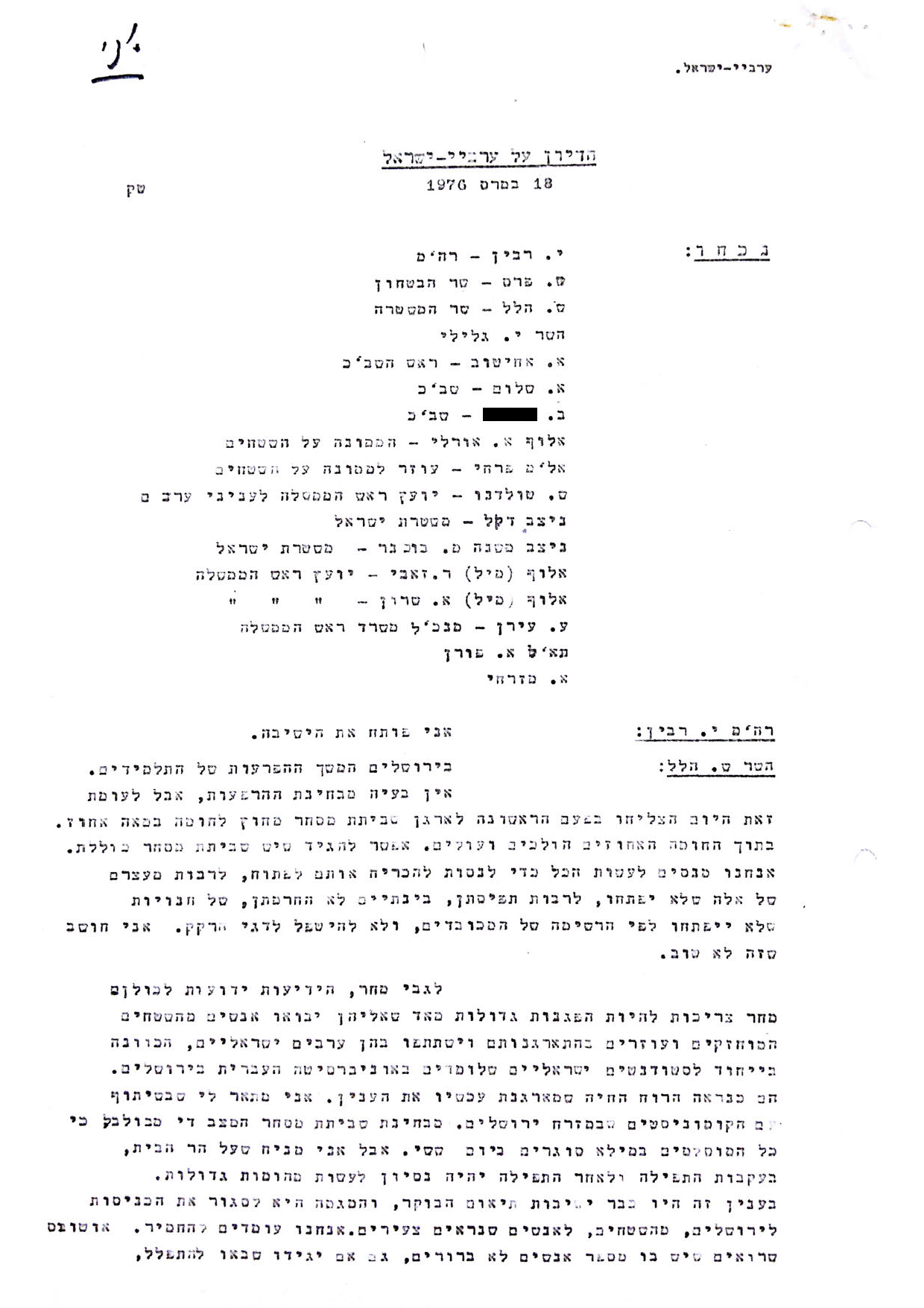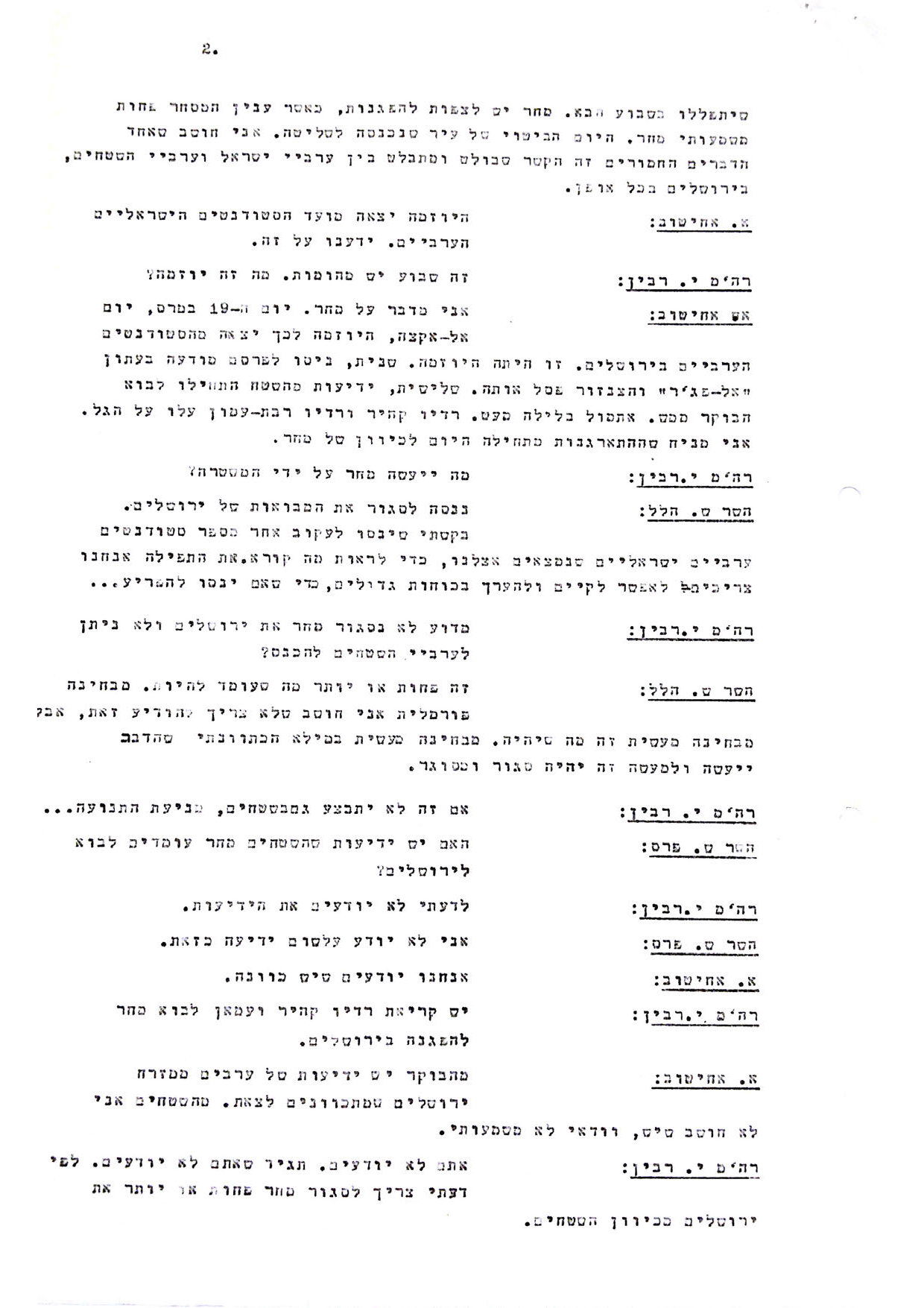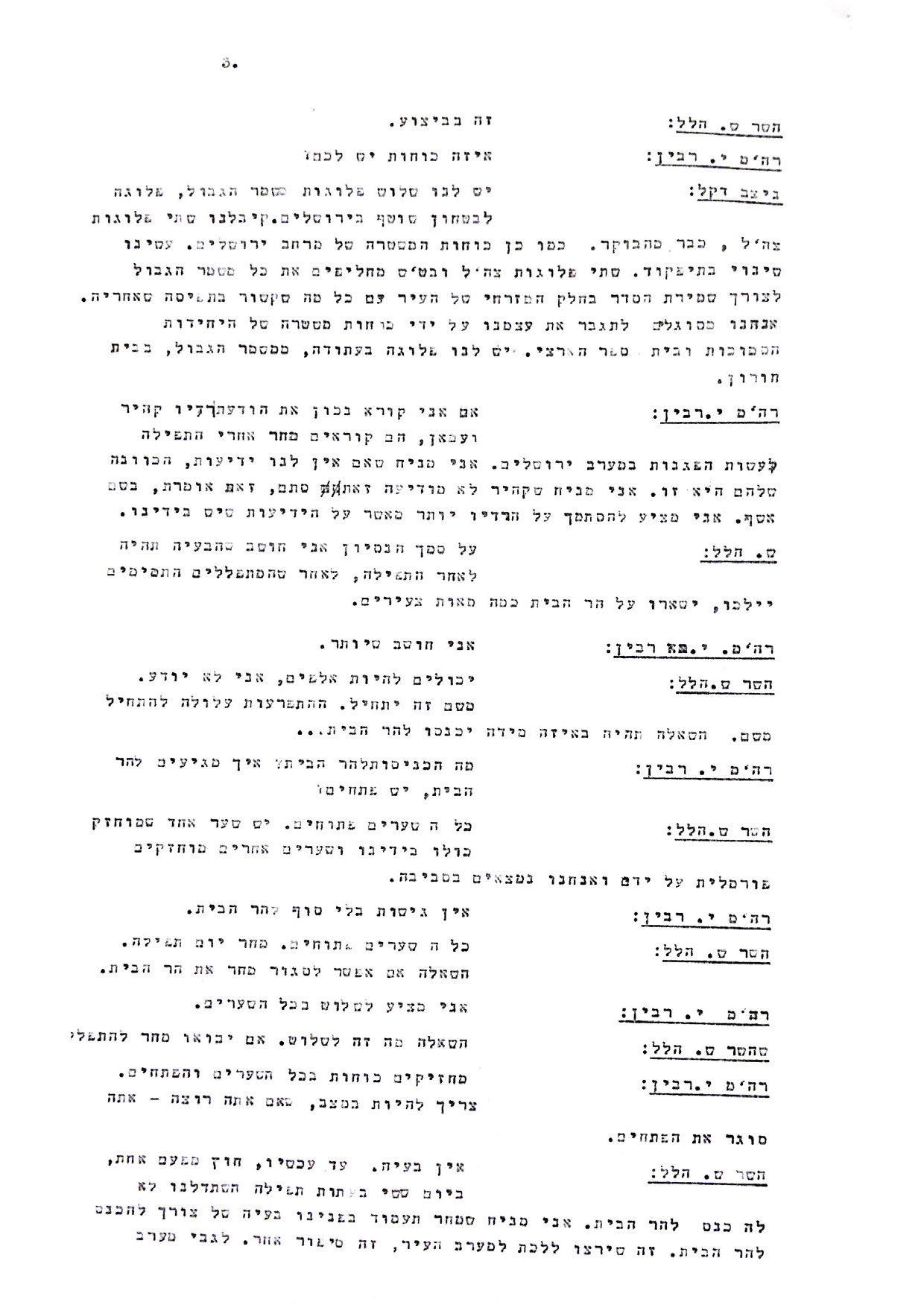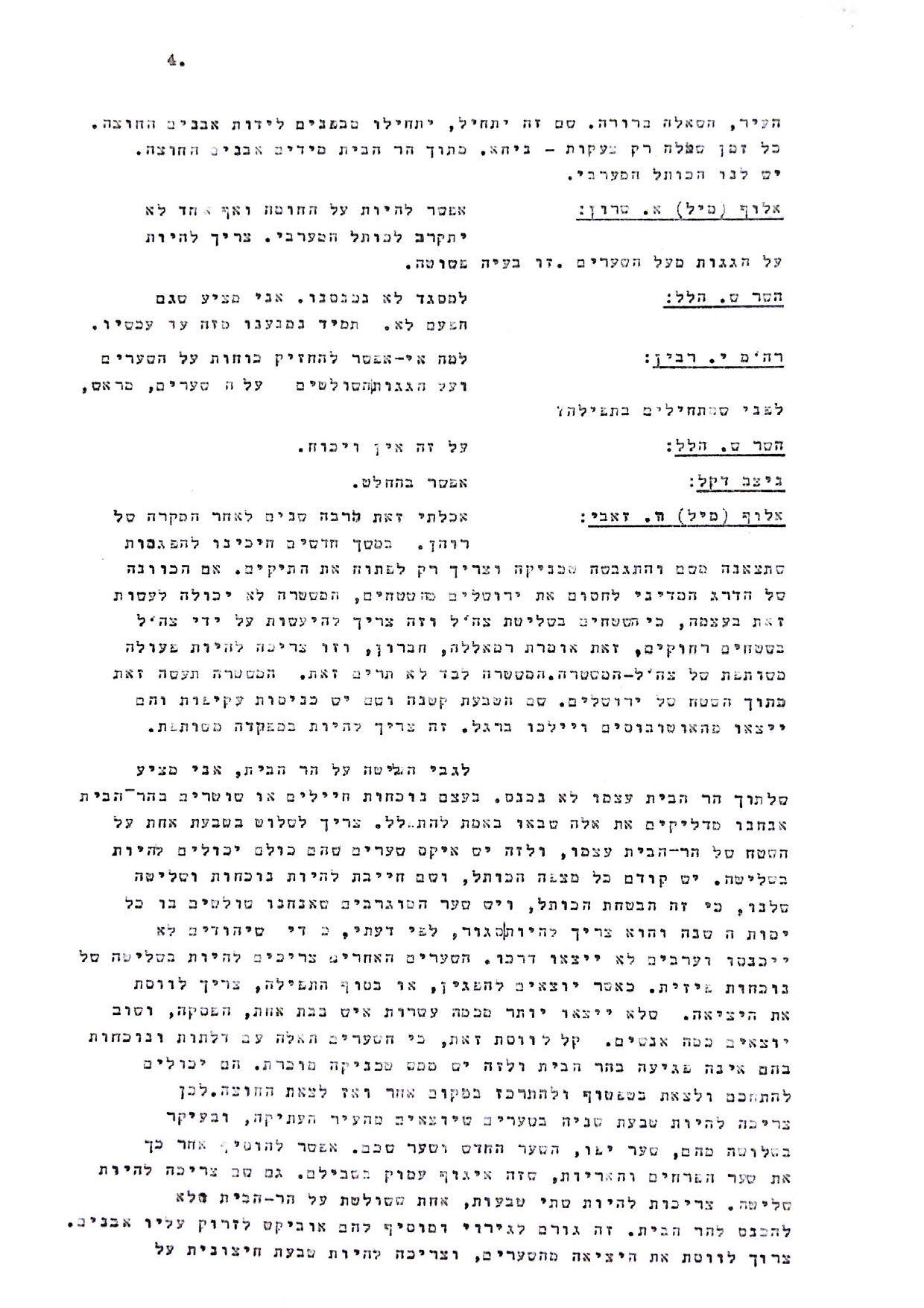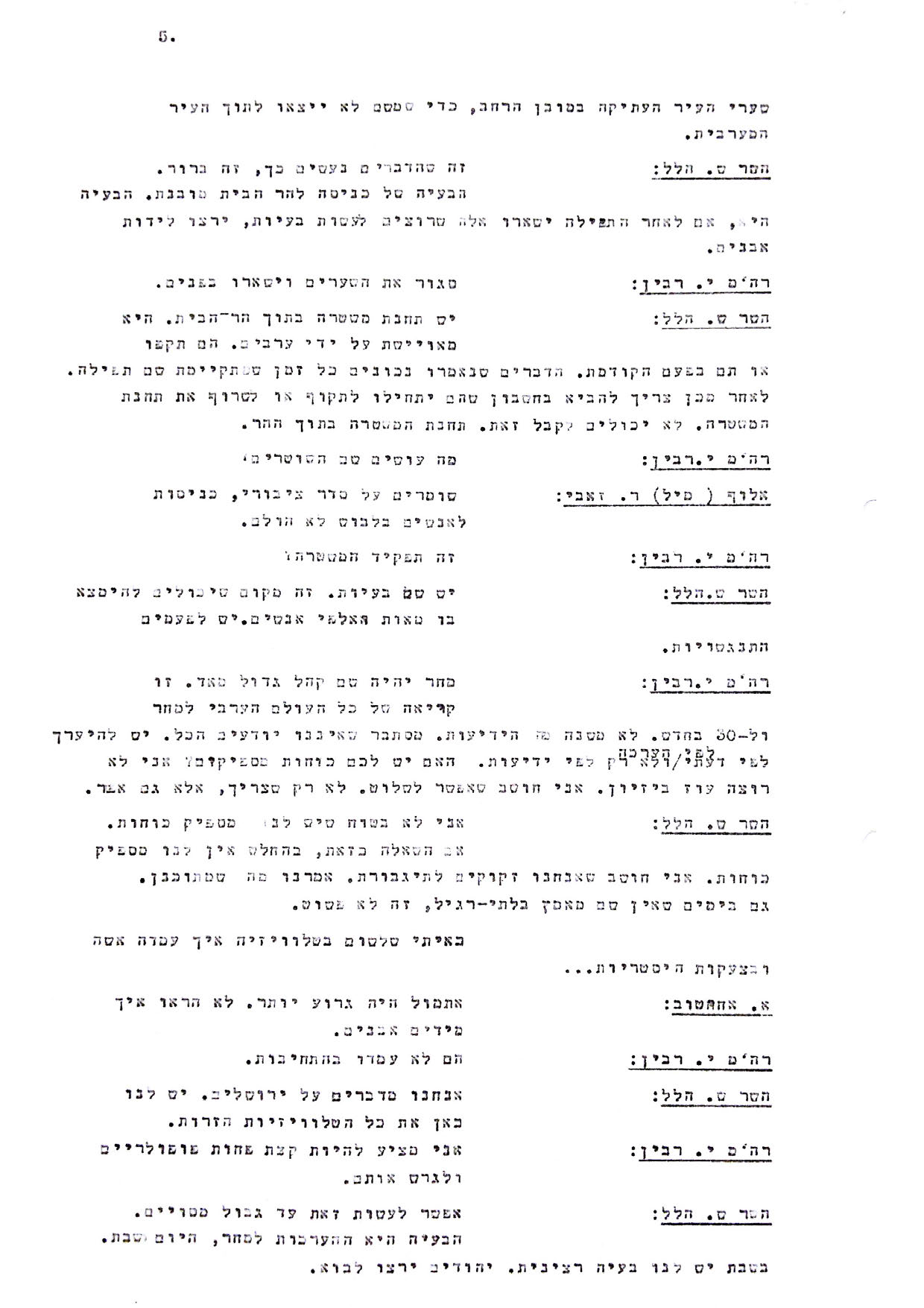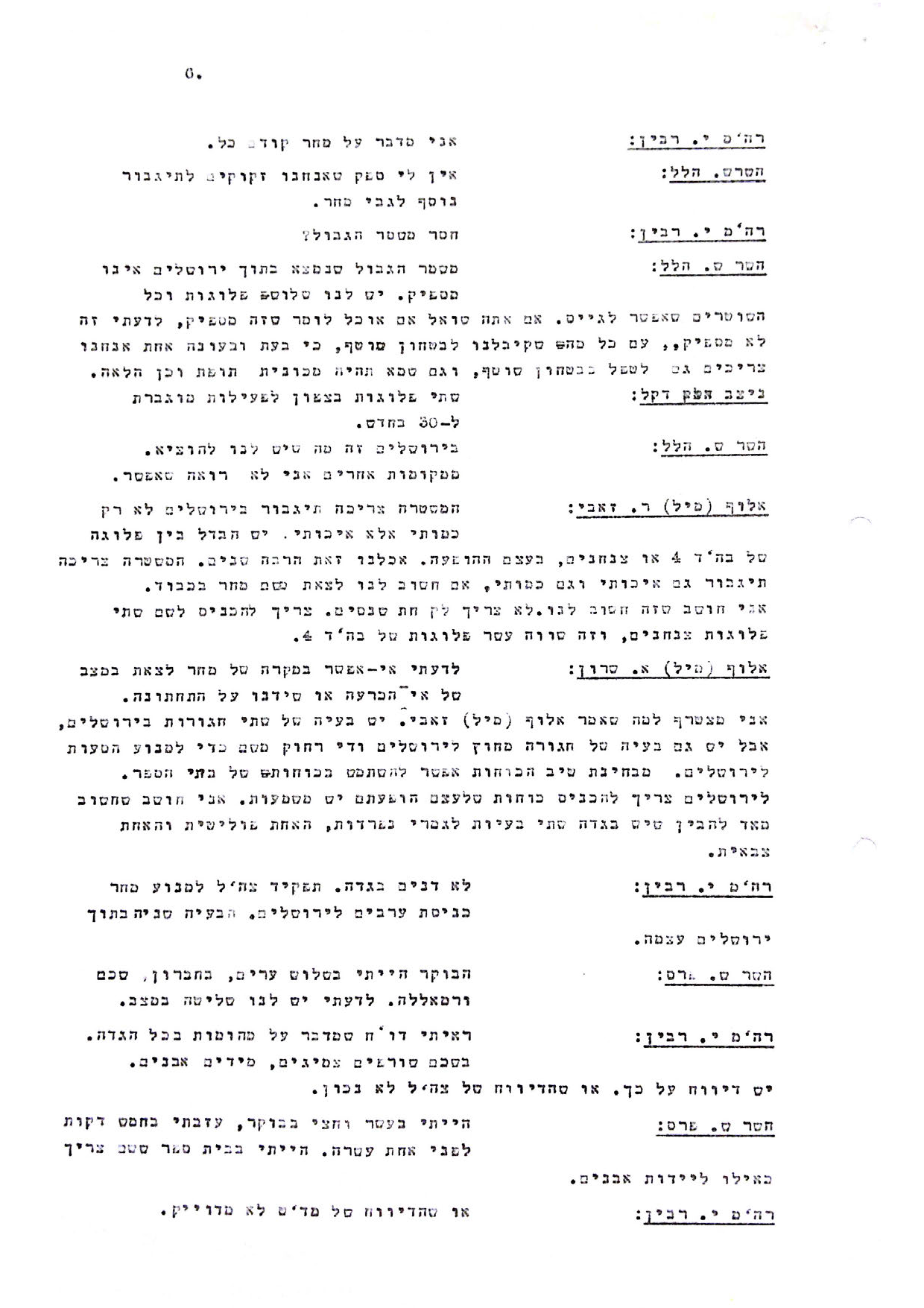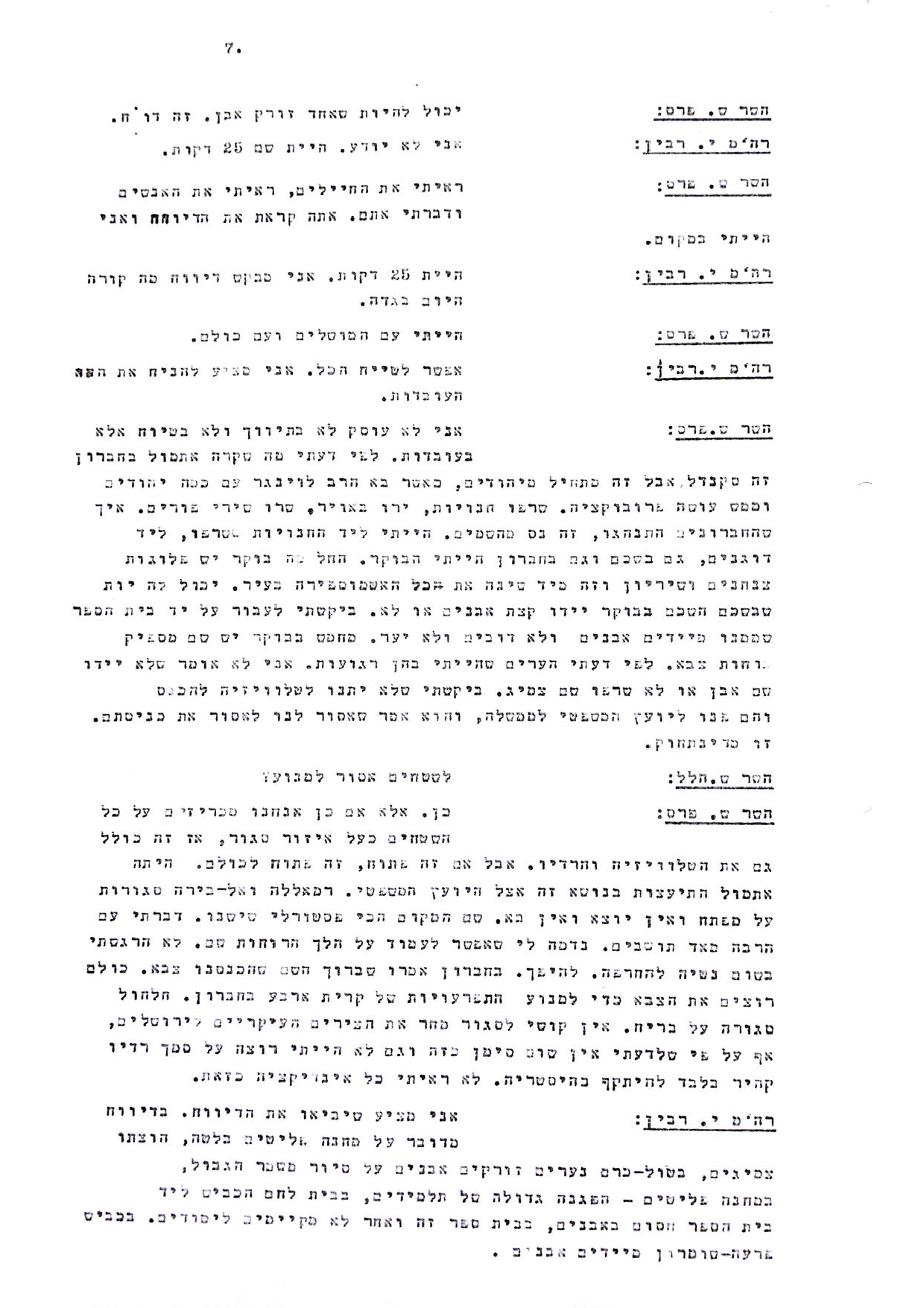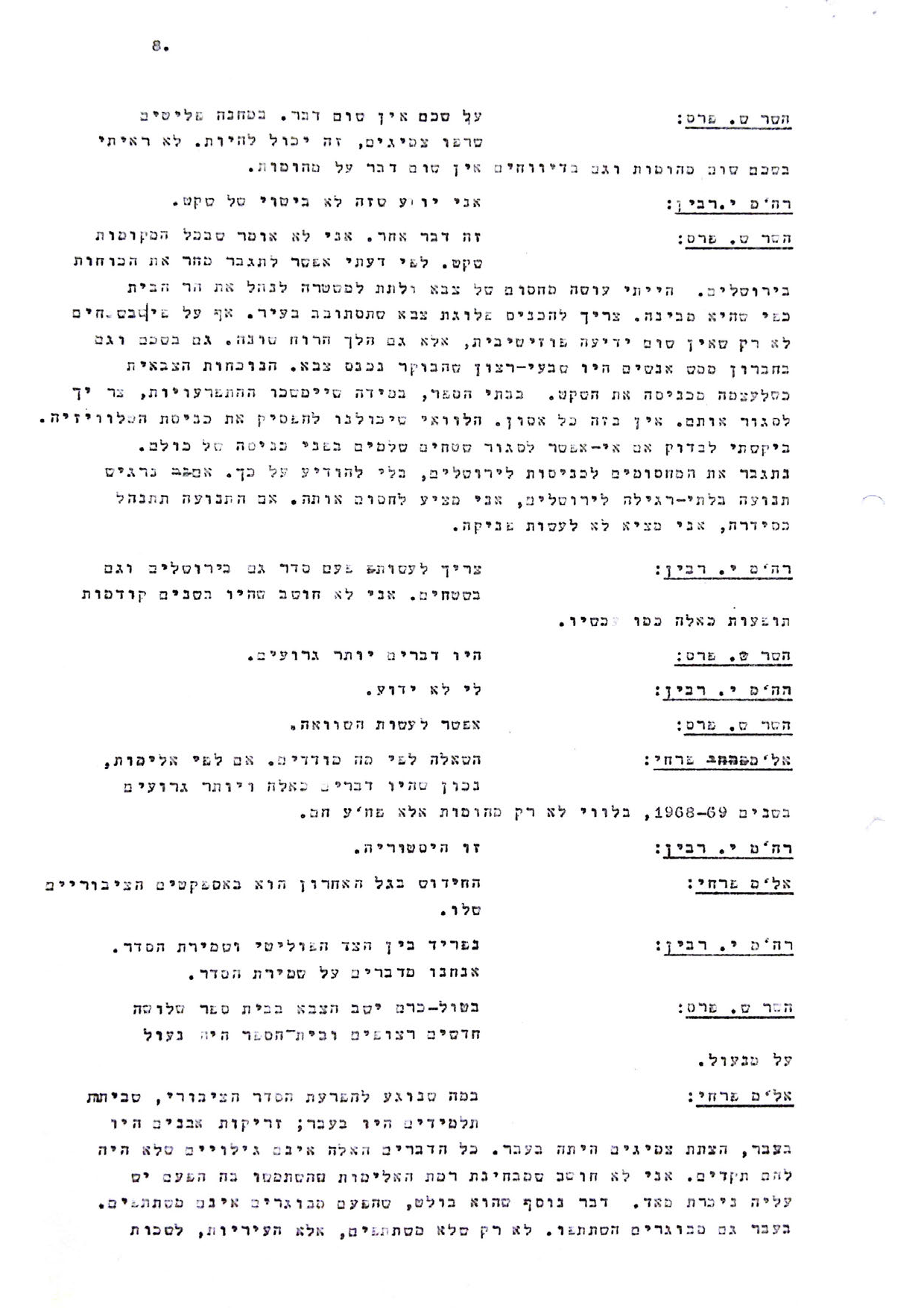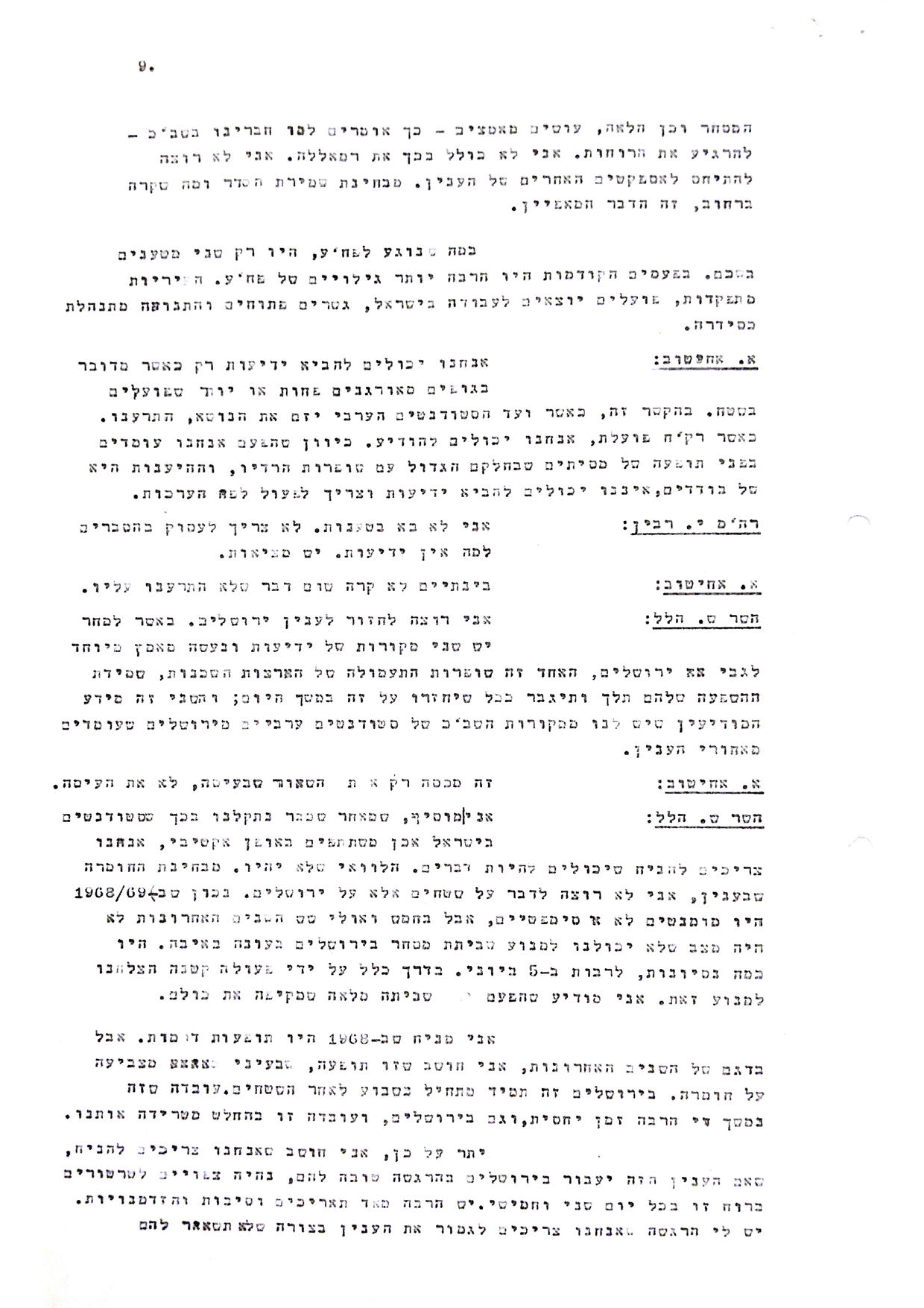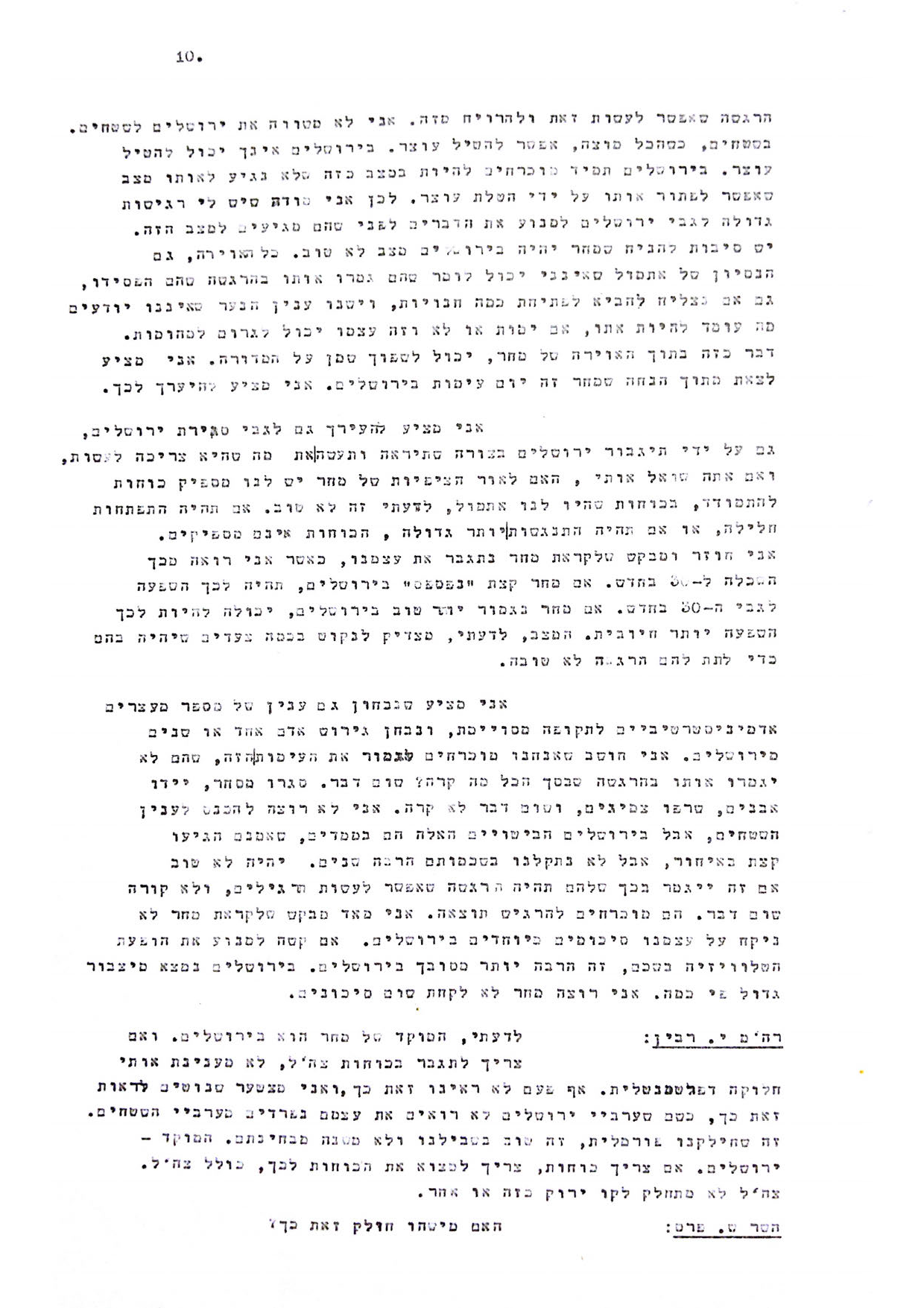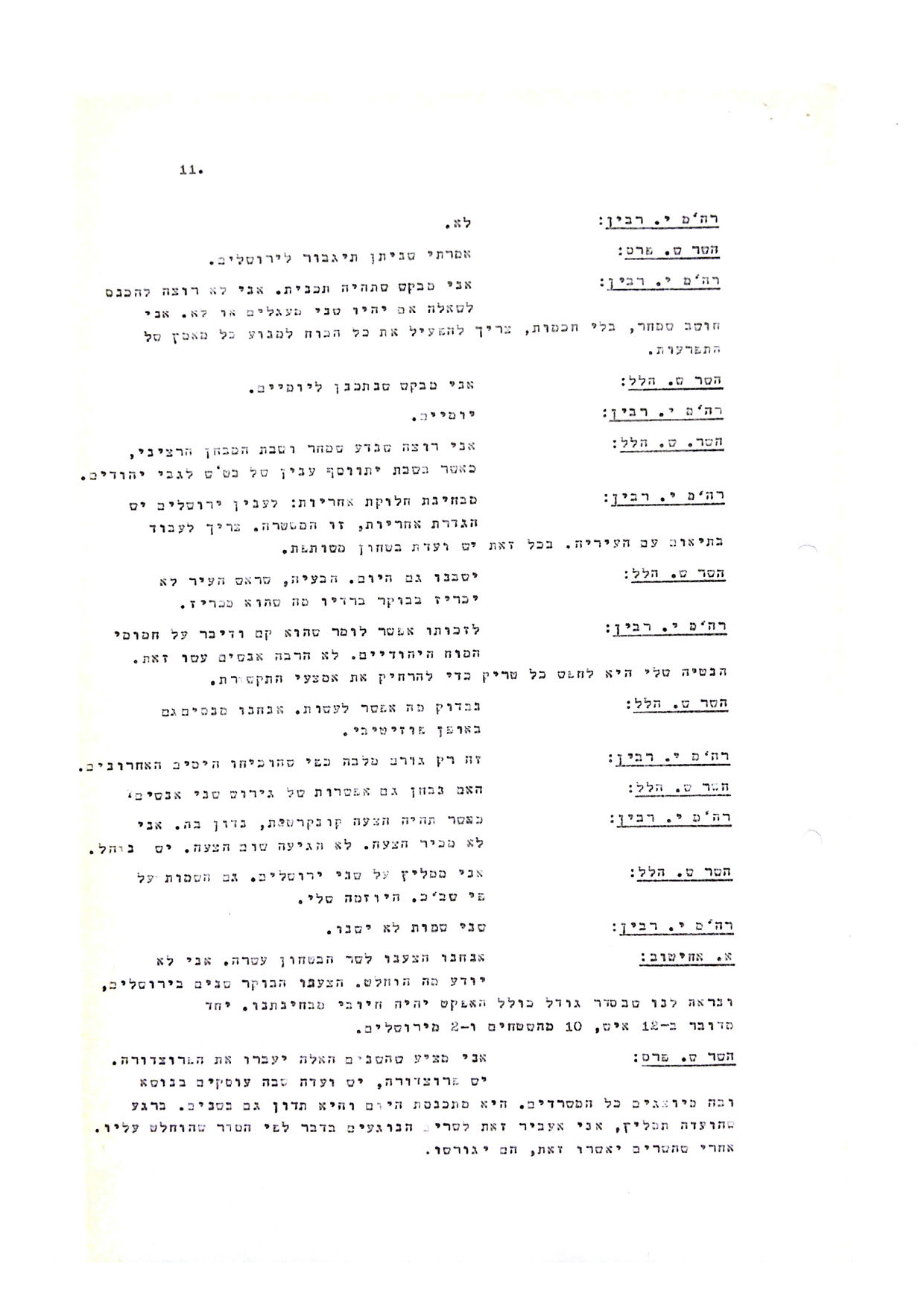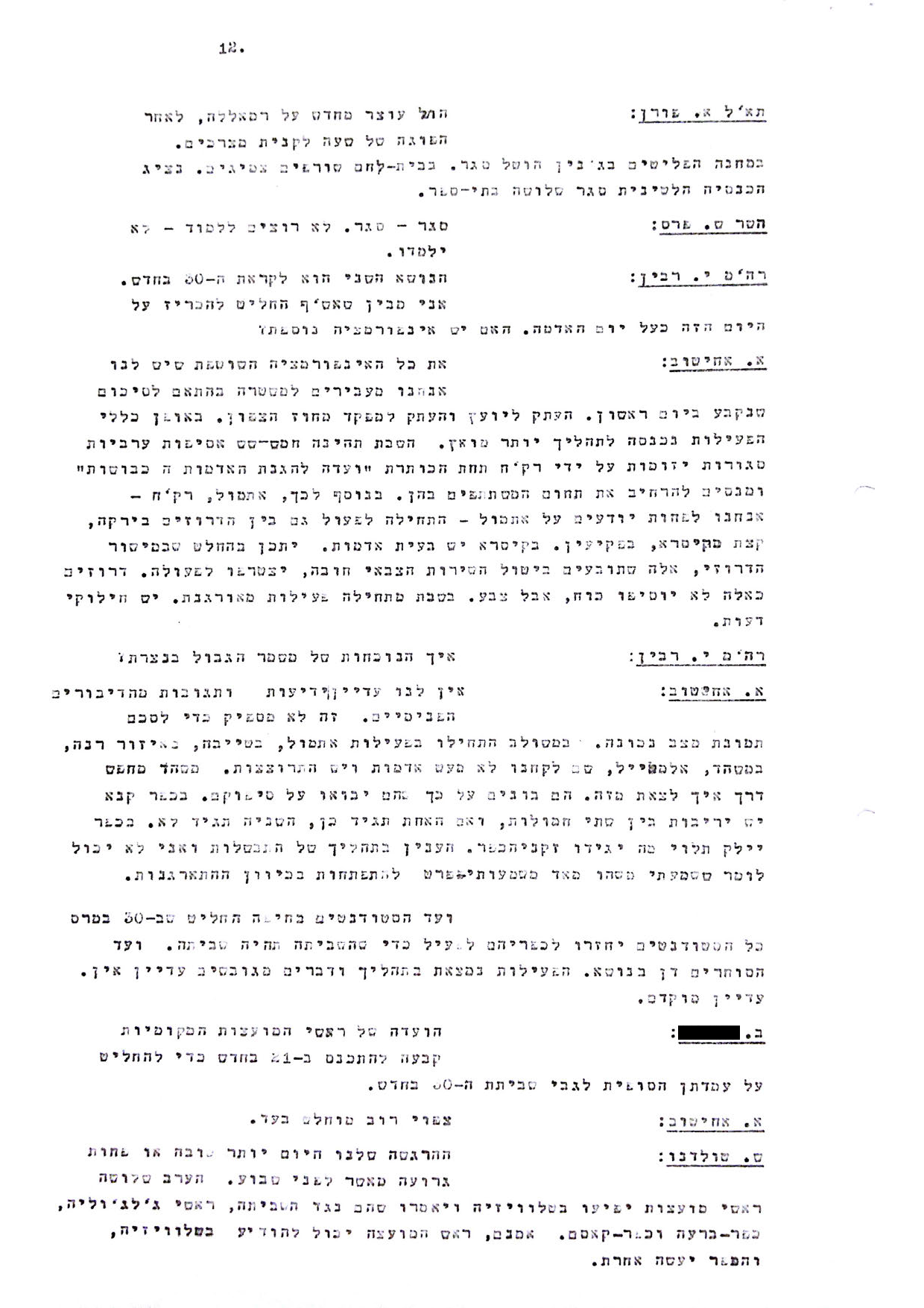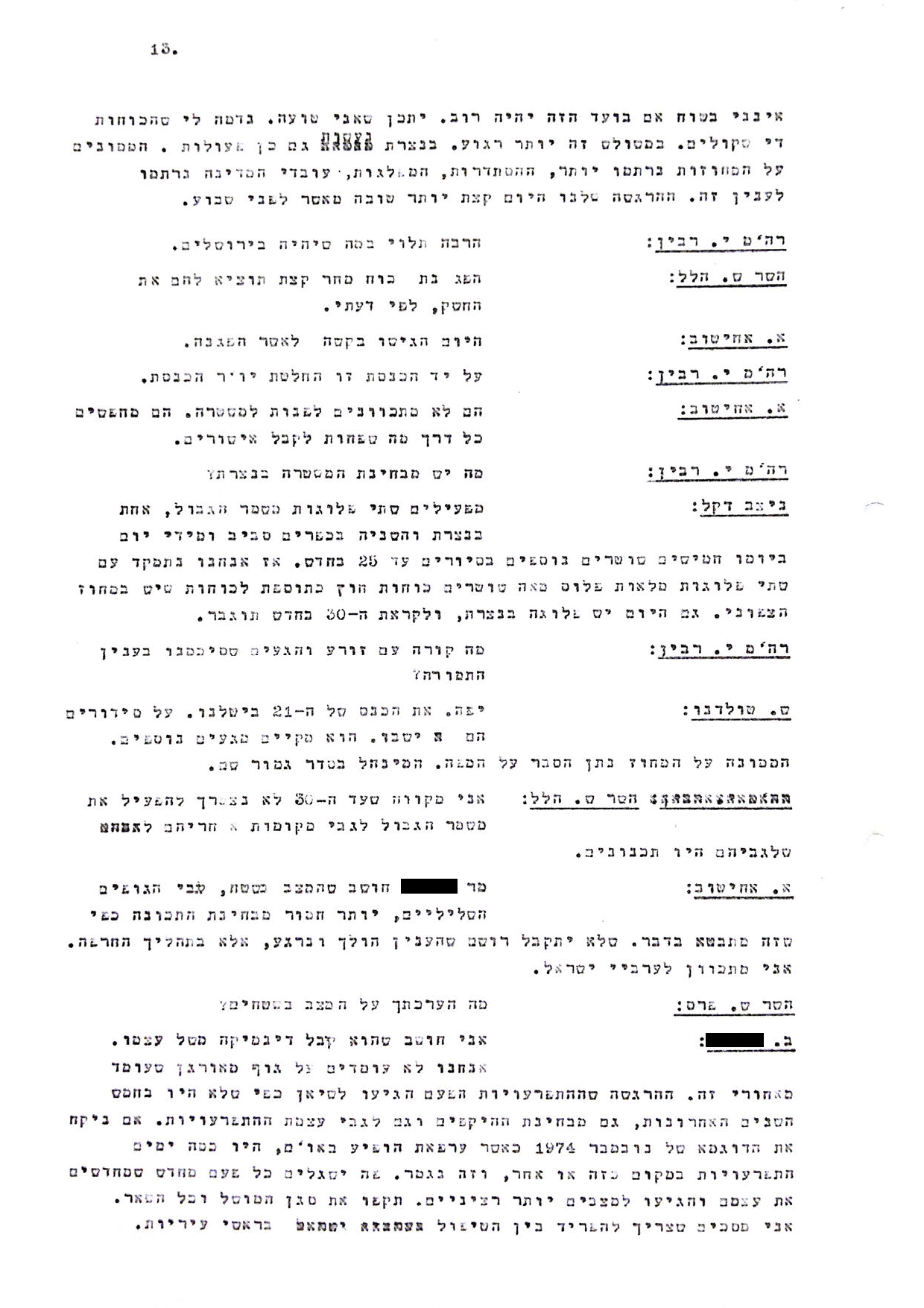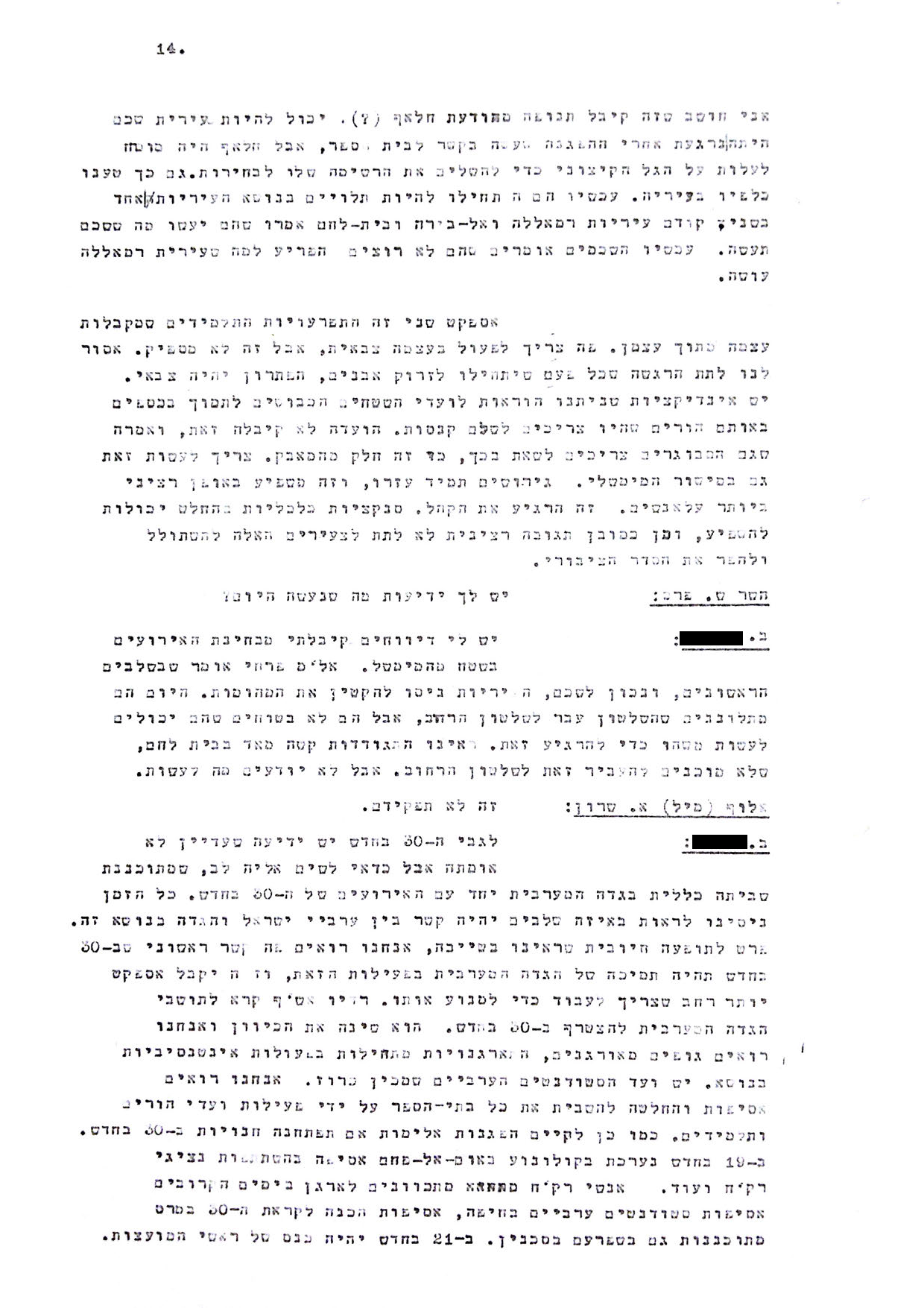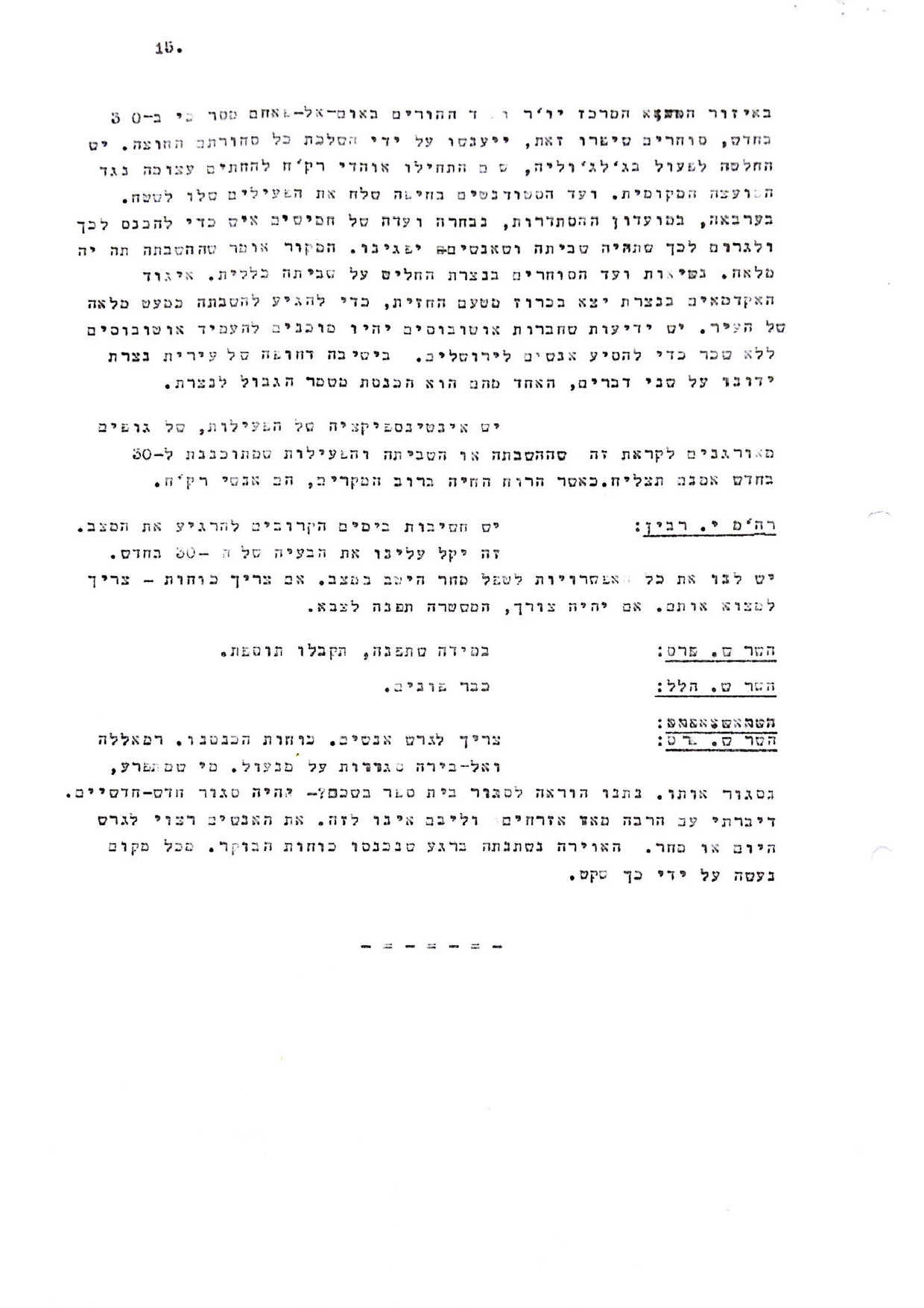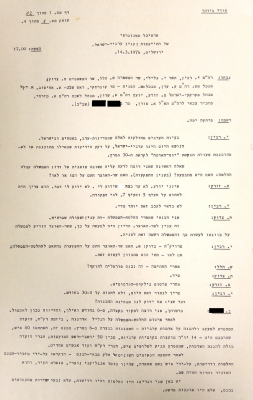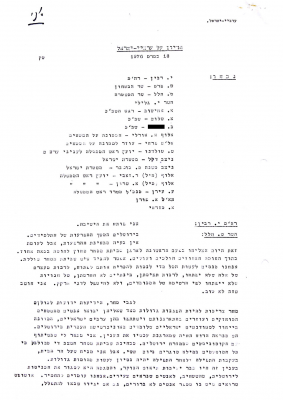In March 1976, Prime Minister Yitzhak Rabin convened several meetings to discuss the forthcoming Land Day, a day of protest called by the political leadership of the Palestinian community in Israel in response to Israel’s plan to renew land expropriations. Transcripts from these meetings, presented here for the first time, uncover the consultations held prior to the bloody events of March 30, 1976, which left six people dead and became a defining moment in the collective memory of the Palestinian public in Israel.
Transcript of Consultation On Israeli Arabs. 14 March 1976
Background on the First Land Day
During the summer of 1975, the Israeli government announced wide-scale expropriation of Arab land in the Galilee, as part of a broad policy of “Judaization of the Galilee. In response, the National Committee for the Defense of Arab Lands in Israel announced protests and a general school, trade, and labor strike for March 30, 1976 demanding an end to the expropriation.
In most places where protests were held, public order was maintained. However, where security forces had a massive presence and took forceful action, tempers flared, leading to casualties: Six Arab citizens were killed in clashes with police, while dozens of Arab citizens and security forces were injured.
The night before the strike, the heads of the local councils of Deir Hanna, ‘Arabeh and Sakhnin met with local police commanders. They said they intended to hold a quiet strike and asked to keep police forces away from the area, assuring them that local leadership would keep the peace. The council heads charged that the police did not abide by the understandings that were reached. Four locals were killed in the clashes that erupted in the area. The other two were killed in Kafr Kana and Taybeh.
The actions taken by the security forces were heavy-handed, including excessive police presence and preemptive arrests that agitated the Arab public and fueled the escalation. Muhammad Hussein, the head of the Deir Hannna local council said the police “arrested young men in their homes, as they were sleeping. They beat them with clubs, swore at them and humiliated them in front of their parents”. The Black Book published by The National Committee for the Defense of Arab Land contained the eyewitness account of Nayfeh Diab Khatib from Deir Hanna: “I was sitting on the balcony of the house. Suddenly, two cars with police officers came. They raided the house when my children were still in their pajamas, asleep in their beds. They got to them before I did and started waking them up using clubs… My children didn’t do anything special”.
Land Day has become a day of remembrance for the Palestinian public in Israel, and a defining moment in its collective memory. Every year, on March 30, Palestinians hold ceremonies and rallies to commemorate those killed on that day in 1976. Land Day has become a symbol of protest against government policies towards Israel’s Arab minority – both on the national and civilian levels.
Discussion on Israeli Arabs, 18 March 1976
Review of Meeting Transcripts in Preparation for Land Day
In early March 1976, weeks before the Land Day, scheduled to take place on the 30th of that month to protest Israel’s plan for extensive land expropriations in the Galilee, the country was already in turmoil. The popular satirical TV show of the day, “Nikuy Rosh”, aired a scathing criticism of the plan itself and the ethos underlying it.
Shlomo Hillel, who was the Minister of Police at the time, was unhappy with the sketch and suggested contacting newspaper and TV editors about it. In a consultation held by Prime Minister Rabin on March 14 with the highest-ranking government ministry officials and the top command of the police and the General Security Service (Shin Bet), Hillel said: “We must point out the danger encapsulated in such things should we lose control over them”. This was one of two discussions devoted to policy response to Land Day.
The expropriation plan signaled the end of more than a decade long suspension of this policy. After extensive expropriation action in the years following Israel’s establishment, the state did not expropriate Arab-owned land from the early 1960s to the mid-1970s. The policy shift came in the summer of 1975, when Israel announced plans to expropriate lands in the Galilee as part of an open and publicly discussed policy of “Judaization of the Galilee”. The large-scale expropriation announced by the government was meant to facilitate the implementation of a plan devised by the Jewish Agency Settlement Division in November 1974 for “accelerated development of the Galilee hills, including plans to boost the population in Safed, Ma’alot, Karmiel and Nazareth”. Similar plans had been discussed by the Levy Eshkol government, but they were shelved after the 1967 War.
Though some civil servants and government officials tried to underscore how the development of the Galilee could benefit the Arab public, the Arab public itself displayed mistrust in the plan’s objective and a growing recognition that the government was out to dispossess Arabs of their lands. Shortly after the government renewed the expropriation policy, Hanna Nakara, a member of The National Committee for the Defense of Arab Land, said, “The authorities cannot bear the reality of Arab villages in the Galilee. They aspire to make Arabs of the Galilee a small minority and to expel them from their lands, from their homeland”. One of the committee’s announcements stated: “We are a nation that has been facing the tragedy of dispossession for thirty years… The time has come for us to say to the rulers of Israel – No more!”
In the months leading up to the expropriation, Shmuel Toledano, the prime minister’s Arab affairs adviser, advocated for the matter to be discussed by the government. Toledano believed that the political importance of the issue warranted a government level discussion instead of the senior official level discussions held at the time. The executive director of the Israel Land Administration, Major General (reserves) Meir Zorea, and the GSS objected to the idea. Toledano had concerns over the reaction to such a plan in the Galilee. Back in 1972, he advised Prime Minister Golda Meir to reject a request made by the head of the Karmiel local council to expropriate land for the purpose of further development. Toledano said at the time, “we would reawaken a problem that has been dormant”, adding, “It is very desirable for us that the issue of Karmiel and the ‘dispossession of Arabs’ does not come up again in the Arab sector”.
Thanks to Toledano’s pressure, the matter was put on the government’s agenda. Mapam ministers Victor Shem-Tov and Natan Peled suggested putting off the expropriation until a fair and comprehensive plan for the development of the Galilee was drafted. Their view was rejected. The entire exchange remains unknown since the full transcripts of the government sessions are still inaccessible to the public (despite the fact that under the Access Regulations, they should have been declassified 14 years ago). It is clear, however, that Toledano did not emerge the victor. The government decided to expropriate Arab lands and provide compensation in the form of land elsewhere “where possible”.
In late February 1976, the government announced the expropriation of 20,000 dunam of Galilee land, 6,300 was Arab owned and 4,400 Jewish owned. The spark that ignited the anger of the Arab population was the expropriation planned for Deir Hanna, ‘Arabeh, and Sakhnin, which designated for the expansion of the town of Karmiel which was built nearby a few years earlier. In response, The National Committee for the Defense of Arab Land announced Land Day, “a day of striking and protest in the Arab areas of Israel”.
Prime Minister Yitzhak Rabin and Minister of Defense Shimon Peres were present in both discussions regarding preparations for Land Day, along with other senior officials. A reading of the transcripts, published here for the first time, confirms the claims made by The National Committee for the Defense of Arab Land, as published in the Black Book of Land Day in September 1976, that, “The regime used a variety of means to prevent or frustrate the strike. It used threats and intimidation; it made spectacles designed to show force, it sent armed forces into our Arab villages”. The transcripts reveal that some officials supported the use of threats and pressure on Arab local councils, public figures, business owners, and residents in an effort to prevent a legitimate strike by Israel’s Arab citizens. Some participants expressed concerns over increased coordination between Arab citizens of Israel and Arab residents of the Occupied Palestinian Territories (OPT).
In a meeting held on March 14, Toledano advocated for a restrained response to the planned protests: “Decisions must be made, but not provocations”, he urged. Minister of Police Shlomo Hillel voiced a similar view: “Presumably, it could, here and there, escalate into road blockages using rocks and tires and stone-throwing”. However, he did not expect much more from the protestors. Hillel’s view on this was founded. The Communist Party of Israel (then called Rakah), which led the Arab public and steered the preparations for Land Day, favored quiet, non-violent protests.
Other views expressed in the meeting favored a stronger, more aggressive response. Ministry of Interior General Director Chaim Kubersky, for instance, thought stronger presence by the Border Police in Arab communities during those tense days would dampen the motivation to strike. Kubersky, like others, suggested attempting to sabotage the strike by mobilizing provocateurs, and hurting Arab economic activity, saying: “We can recruit people from within the public to make efforts to disrupt these meetings”. Kubersky warned against, “being passive in the leadup to this. There is room for a number of actions using the government and the income tax [officials]”. Kubersky suggested one way Israel could intimidate Arab business owners was to have “police and GSS personnel go from business to business and innocuously register business owners. This in itself, could have an important psychological effect”.
Israel Police Deputy Commissioner, Major General Eliahu Dekel, also proposed a show of force through massive reinforcement of police presence, the Border Police in particular, in Arab communities. This step would “contribute to reducing activities”, he explained. Dekel opined that only a show of force of this kind would “convince the esteemed friends” that “the matter was not so simple”. The prime minister’s defense advisor, Ariel Sharon, who at the end of that year transitioned from consulting to politics, expressed concern over the international reaction to Israel’s expropriation plans and suggested warning the Arabs and taking action to “prevent appearances before the UN and other institutions”. Sharon was hinting at a measure the authorities were already implementing in those days – expulsion. He doubted Arab citizens could be legally prevented from attending international forums, “but they can be prevented from returning”, Sharon said. “There is no need for them to appear in these forums. It would be an international sensation, and we have to prevent that”.

